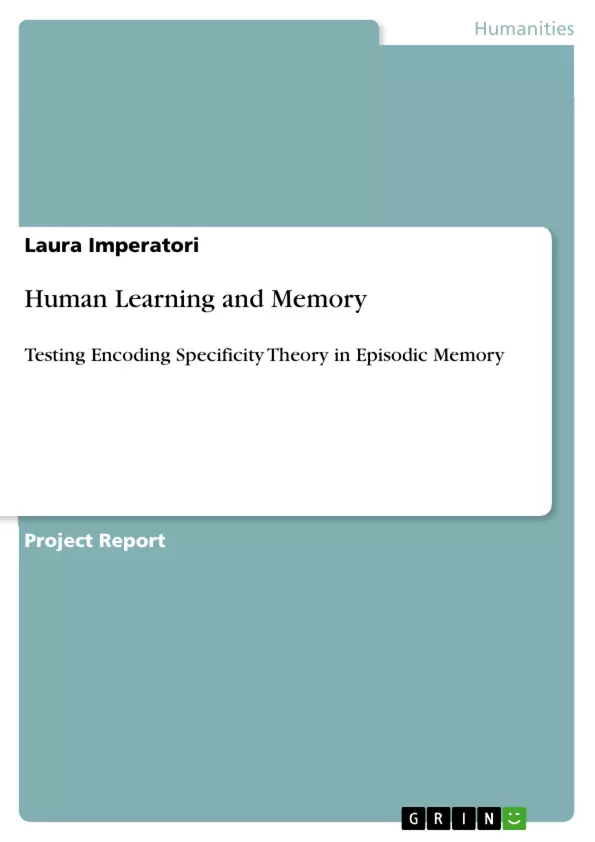The Generation-Recognition Theory and the Encoding Specificity Theory that both deliver a process description of human memory were both tested by the Cued Recall & Recognition test - a simplified form of experiments performed by Watkins and Tulving. The Cued Recall & Recognition test was performed on 42 subjects overall and the proportion of words that were recalled, but not recognised, was determined to be 0.27+/-0.19. Two different groups were allocated (unknown to the participants) on the basis of the stimulus sets used (stimulus set 1 or 2) to test the influence of the stimulus sets on obtaining the above results. We verified that our results were not likely to be due simply to the specific stimuli that were used but showing a more general effect given that we found t(40)_{0.05}=1.168 in a two tailed t-test, and, thus, retained H_{0}: ``There is no significant difference in the proportion of words recalled, but not recognised, between the two groups (due to the different stimulus sets used).'' The significant proportion of words being recalled but not recognised contradicts generation-recognition theory, but supports encoding specificity theory, which argues that retrieval is based on a congruence between how information was encoded (or studied) and how it is accessed at retrieval, hence memory is highly context-dependent and episodic in nature.
Inhaltsverzeichnis (Table of Contents)
- Introduction
- Generation-Recognition theory
- Encoding-Specificity theory
- Methods
- Results
- Discussion
- Conclusion
- References
Zielsetzung und Themenschwerpunkte (Objectives and Key Themes)
This report investigates the generation-recognition theory and the encoding-specificity theory of human memory by conducting a simplified version of experiments previously performed by Watkins and Tulving. The study aims to determine whether recall performance can be greater than recognition performance, contradicting the generation-recognition theory, and to analyze the impact of encoding specificity on memory retrieval.
- Generation-recognition theory
- Encoding-specificity theory
- Cued recall and recognition performance
- Context-dependent memory
- Episodic memory
Zusammenfassung der Kapitel (Chapter Summaries)
- Introduction: This chapter introduces the concepts of recall and recognition memory and presents the generation-recognition theory and encoding-specificity theory. It outlines the rationale for conducting the study and its key objectives.
- Methods: This chapter details the experimental design of the Cued Recall & Recognition test, outlining the four stages of the task. It explains the modifications made to the original experiment by Watkins and Tulving and the use of two different stimulus sets to assess the generalizability of the findings.
- Results: This chapter presents the results of the experiment, highlighting the proportion of words recalled but not recognized and the statistical analysis conducted to determine the significance of the findings.
- Discussion: This chapter explores the implications of the results for the generation-recognition theory and the encoding-specificity theory, critically analyzing potential limitations of the study and addressing alternative perspectives.
Schlüsselwörter (Keywords)
This report focuses on the core concepts of generation-recognition theory, encoding-specificity theory, cued recall, recognition performance, context-dependent memory, episodic memory, and statistical analysis. The study aims to contribute to the understanding of human memory processes and the factors that influence retrieval.
Frequently Asked Questions
What is the Encoding-Specificity Theory?
This theory argues that memory retrieval is most effective when the conditions at the time of retrieval match the conditions at the time of encoding (context-dependency).
What is the Generation-Recognition Theory?
This theory suggests that recall involves a two-step process: generating possible candidates and then recognizing the correct one. It implies that recognition should always be better than recall.
Can recall ever be better than recognition?
Yes, the study found a significant proportion of words that were recalled but not recognized (0.27), which supports the encoding-specificity theory and contradicts the generation-recognition theory.
What is episodic memory?
Episodic memory refers to the memory of specific events or "episodes" in their original context, which is a key focus of the encoding-specificity research.
How was the experiment conducted?
The study used a Cued Recall & Recognition test on 42 subjects, using different stimulus sets to ensure the results were due to general memory effects rather than specific words.
- Quote paper
- Laura Imperatori (Author), 2012, Human Learning and Memory, Munich, GRIN Verlag, https://www.grin.com/document/274744



